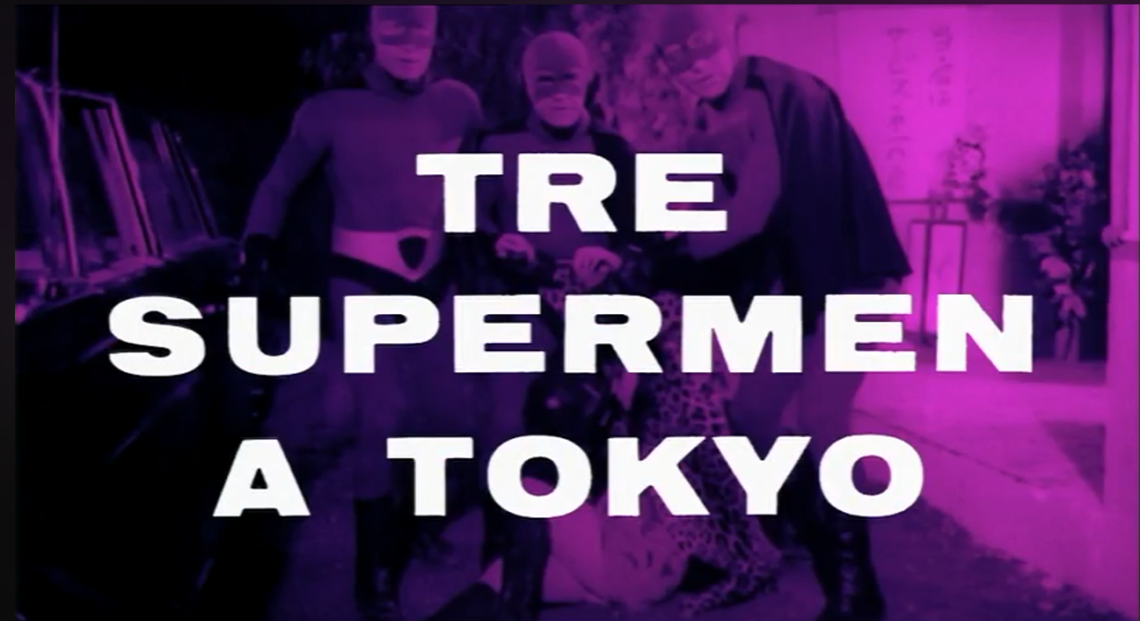-
#551 – Three Supermen in Santo Domingo (1986)
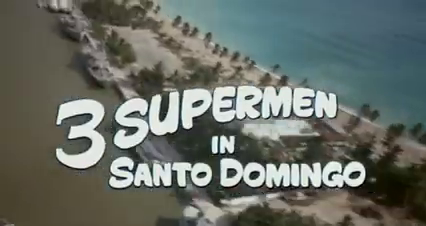
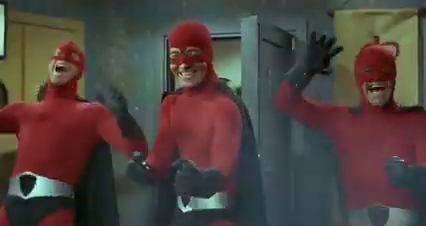
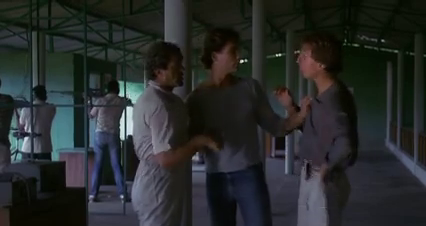
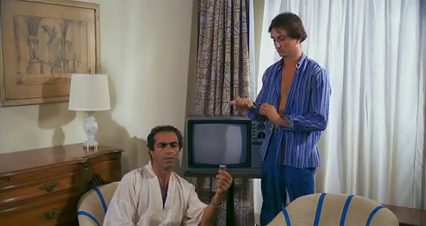
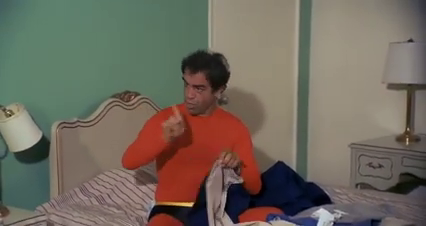
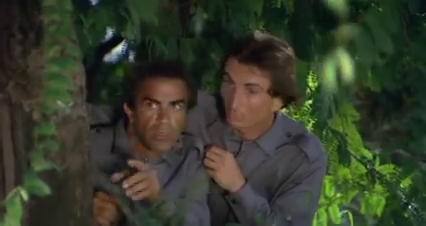

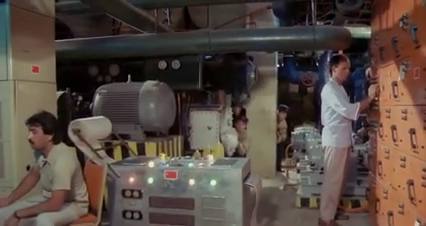
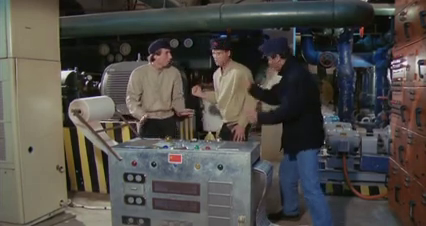
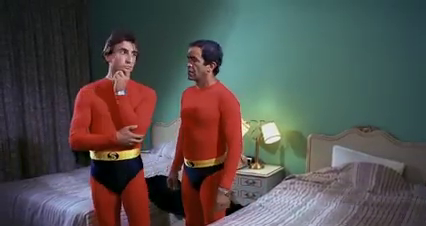
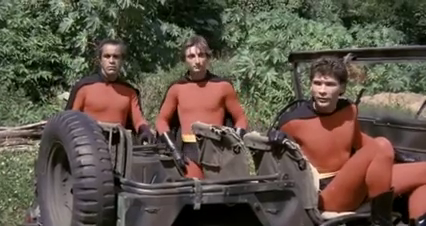
Three Supermen in Santo Domingo (1986)
Film review #551
Director: Italo Martinenghi
SYNOPSIS: FBI agent Brad Scott is once again required to team up with the international thieves known as “The Supermen,” this time they travel to Santo Domingo in South America to disrupt a money counterfeiting operation by some local crime gangs.
THOUGHTS/ANALYSIS: Three Supermen in Santo Domingo is a 1986 film and the final instalment in the Three Supermen series of films. The plot is fairly typical and familiar to those who have watched any of the other films: an FBI agent has to team up with the international thieves known as “The Supermen,” this time travelling to Santo Domingo to stop a counterfeiting operation run by a local gang. There’s no time travelling or outlandish elements in this film; it’s just a simple crimefighting, slapstick bit of fun, although obviously the supermen still have their bulletproof suits, that villains never quite work out that they could just shoot them in their uncovered heads. There’s a variety of action scenes (which consist of a fair amount of speeding up and reversing footage instead of actual stunts), and setups involving disguises, and elaborate plans, but nothing too exciting.
As always, the film revolves around the three supermen, and once again, they are played by different actors; all with the exception of one, Sal Borgese, who has been playing the mute superman since the second film (in the ones which you could consider “canon” anyway). The names of the characters also change quite a lot, and this time it seems like they’ve just resorted to calling Sal’s character Sal. The other two actors change every film, and this time the change is quite apparent, as they are obviously a lot younger than Sal. One of them is Stefano Martinenghi, who is the son of the director, and clearly only got the role because of this: he doesn’t really fit the role of the charming, cheeky lead. The actor playing the role of FBI agent Brad Scott also doesn’t really work because he seems way too young, and typically the role goes to someone who is older and more straight-laced, to balance with the supermen’s goofiness. There are glimmers of that personality, but not much. The rest of the cast aren’t really worth mentioning, as the villains don’t really stand out, and the supporting cast barely exist on screen.
It’s perhaps worth mentioning at this point that this film series has been going on for nearly twenty years at the time this film was made; and there is no reason for it to have done so. The original was a cheap b-movie that spoofed sci-fi and spy films that were popular in 1967, but had a somewhat interesting twist by having professional acrobats play the lead roles, which led to some fun action scenes and well-choregraphed fights. The first film, while nothing more than a typical b-movie, did everything it really needed to, but for some reason it became a series that went on to satirise other types of films, such as Westerns, cold war plots, martial arts films, and even got a Turkish rip-off version…which further still, somewhat fused with the Turkish rip-off scene when production of the films moved to Turkey. The whole production of this series is all over the place, but I suppose credit should be given to the films somewhat adapting to changing to cultural trends. Three Supermen in Santo Domingo doesn’t really offer anything special in this regard though, and while it keeps things simple, it definitely feels like a format that is well past its sell-by date in 1986, and since this is the final film in the series, the makers probably knew this too. Definitely deserves credit for going for twenty years, but its last hurrah is uneventful.
-
#550 – Three Supermen at the Olympic Games (1984)

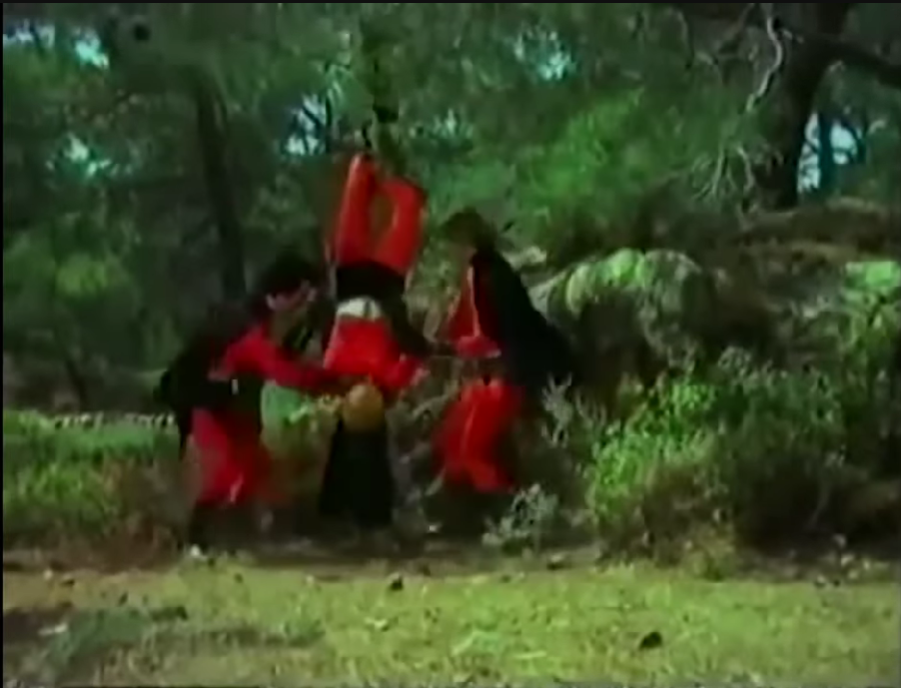
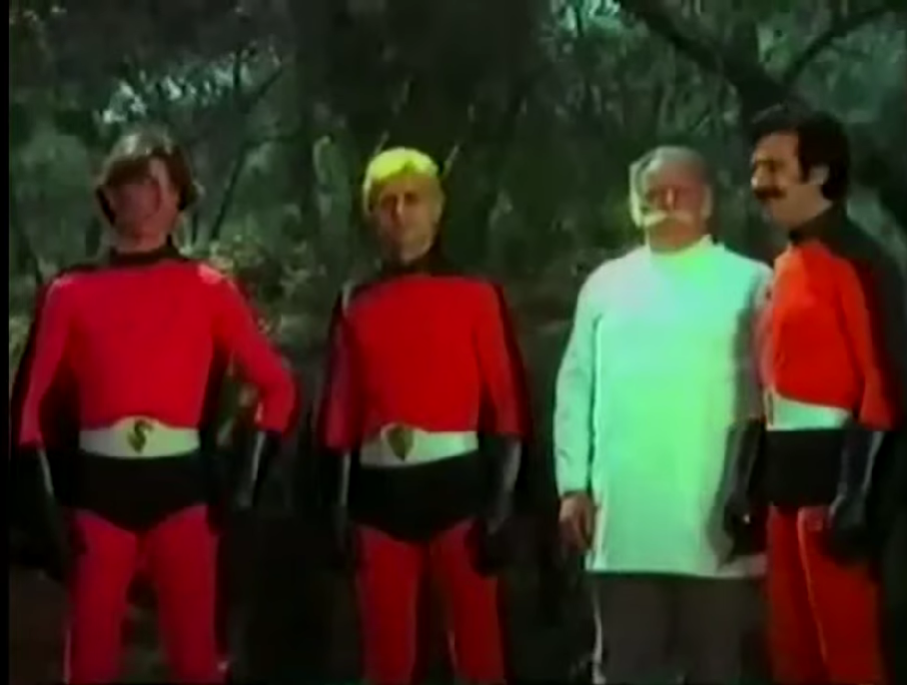
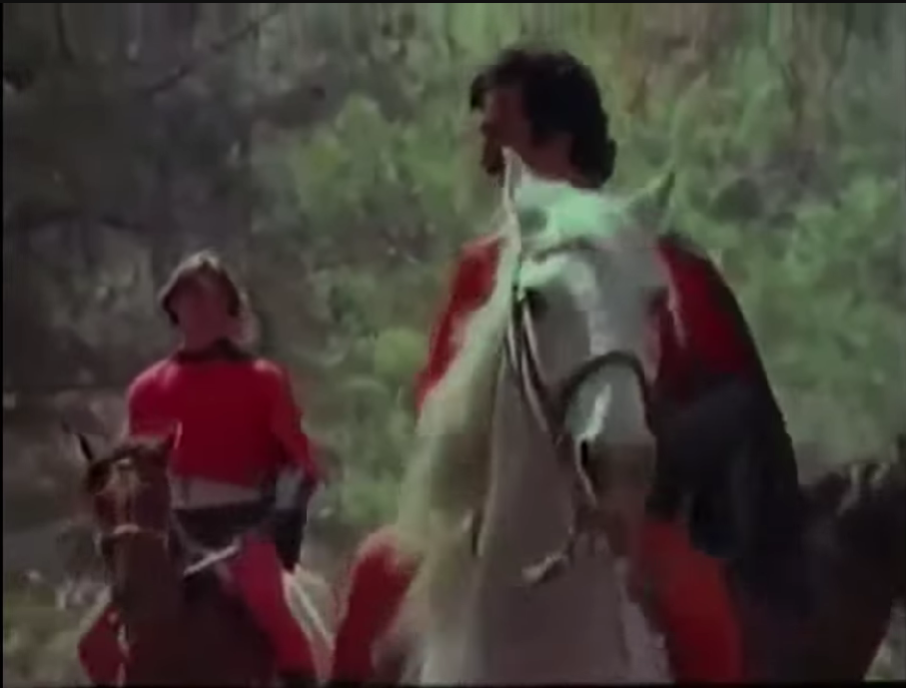
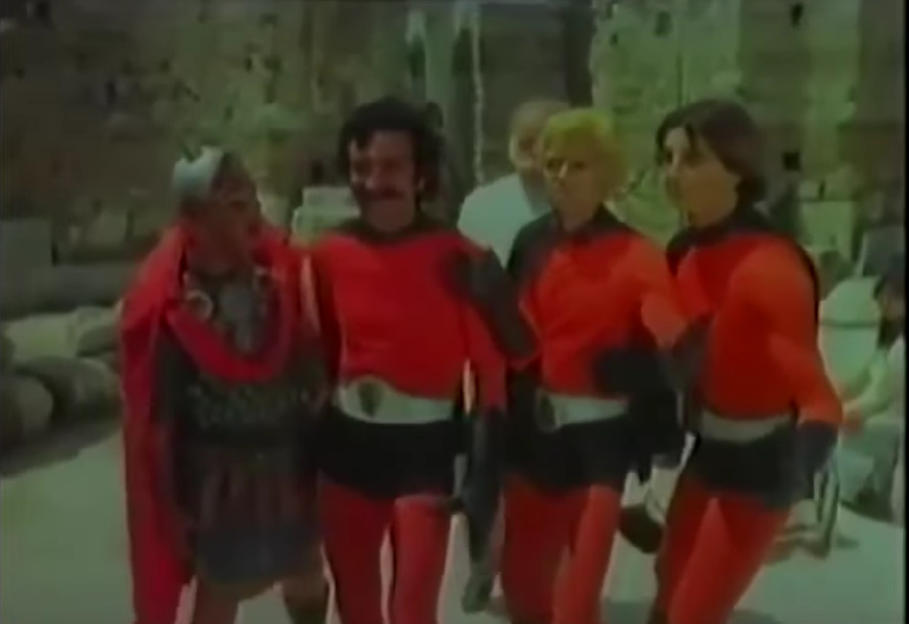
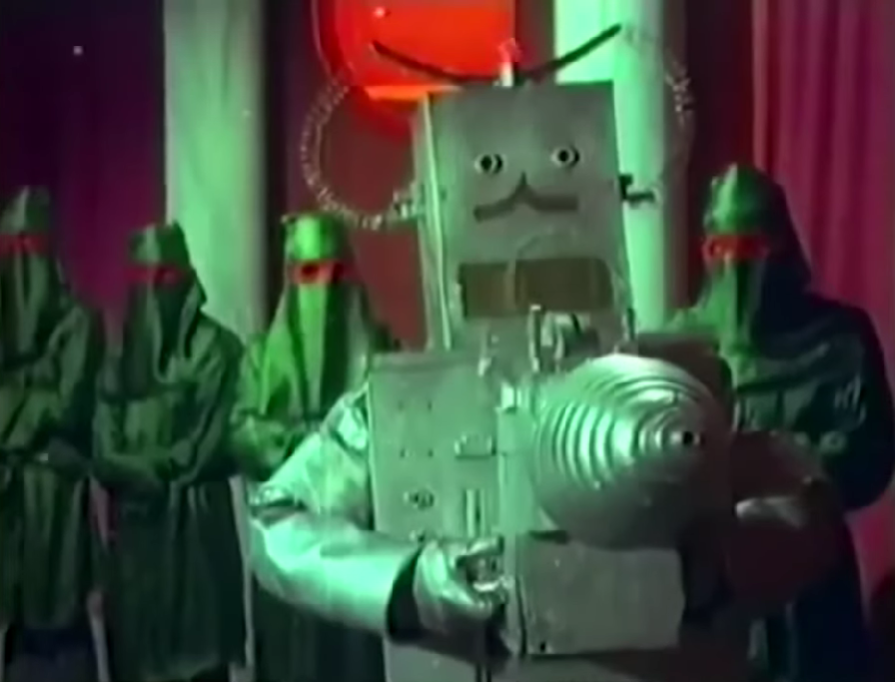


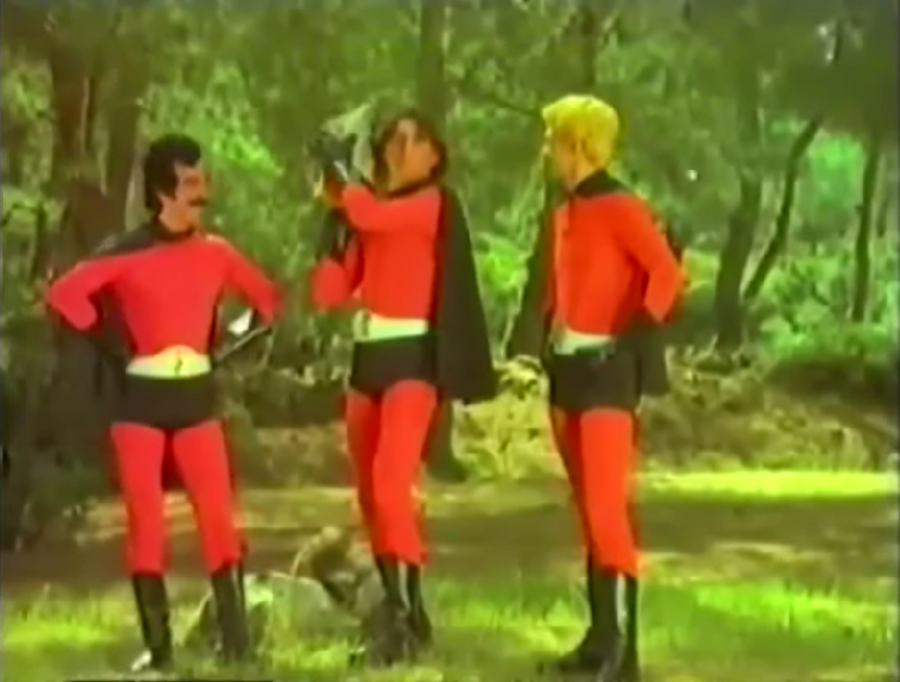
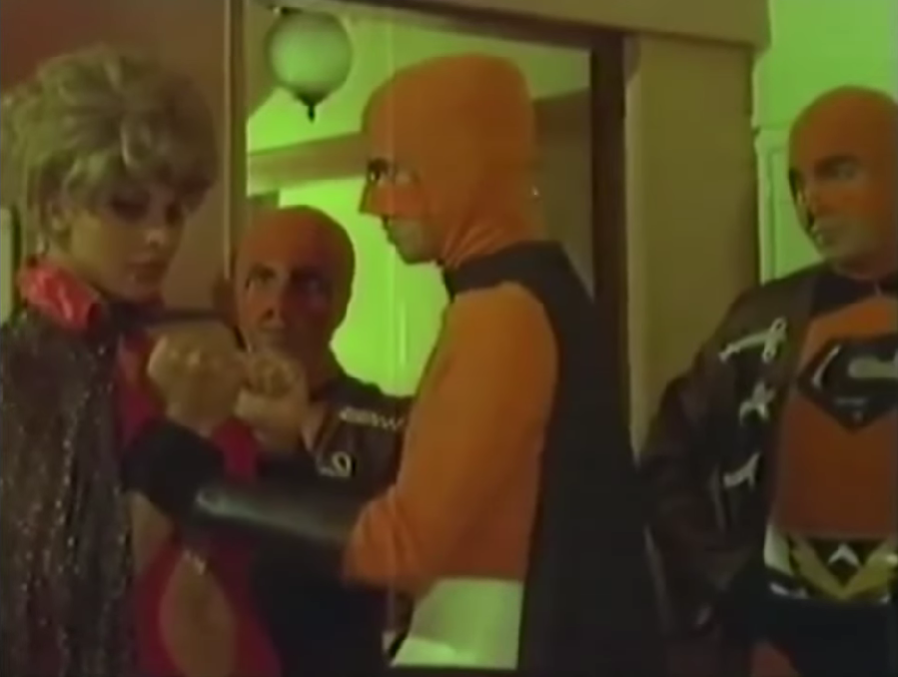
Three Supermen at the Olympic Games (1984)
Film review #549
Director: Yavuz Yalinkiliç
SYNOPSIS: The Three Supermen travel back in time to ancient Greece, where they get roped into the service of the Greek Goddess Artemis, who is fighting off some Romans of some sort.
THOUGHTS/ANALYSIS: Three Supermen at the Olympic Games is a 1984 film, and yet another film in the Three Supermen series of films. This time, The Three Supermen are sent back in time to ancient Greece, where they meet the Greek goddess Artemis, and are dragged into her service in her conflict with what I think are supposed to be ancient Romans. The story in this film is even less coherent than the others: while time travel is not an unfamiliar concept in this film series, Greek gods is certainly a new one, and I’m not really sure what the purpose of the time travel was, or the source of the conflict between the Greeks and probable-Romans. I was only able to watch the film with partial English subtitles, but I doubt a full translation would have helped: the film is a mish-mash of scenes and flaky ideas that feels like a bunch of unrelated footage stitched together. Also, the film also shoves in parts of the Three Supermen and Mad Girl film at two points; as in it just cuts in parts of that film without warning or reason. On the positive side, at least we get to see one of the worst robot designs ever on screen once again. I think the film was made to coincide with the 1984 Olympics and the hype that surrounded it, but there’s no real relation to the Olympics despite the travelling to ancient Greece. I think the Supermen throw a javelin and a shot-putt once, and there’s stock footage of horse racing at the beginning and end of the film: is that supposed to be the Olympics? I’m not sure horse racing has ever been a part it.
This film is not actually a part of the Three Supermen “canon,” with none of the usual cast or production staff returning: it’s a Turkish knock-off film, but given that the film series moved to Turkey in the previous film to appeal to a different audience, it is a bit confusing. The Supermen consist of one of them being mute, so I guess that is one bit of consistency. The supermen are not the usual international thieves his time though, and seem to be actual supermen, as at least one of them is seen flying through the air like the real superman. They also (in the Three Supermen and Mad Girl footage) have the superman logo emblazoned on their uniform. Oh, and if that isn’t enough copyright infringement, the fighting scenes are constantly accompanied by the John Williams Superman theme, which makes the fights more interesting only because that theme can make anything more interesting. A lot of the disjointed scenes are stitched together by close ups of the characters standing in front of a white background, which are clearly filmed after the other scenes, and are meant to stitch this mess together, but it is so clear what the purpose of these scenes are that they only serve to further highlight the ad-hoc constitution of this film.
Three Supermen at the Olympic Games is even more of a mess than the usual Three Superman films: the very thin main plot is surrounded by a bunch of unrelated scenes and nonsense which don’t add anything, and only serve to extend the runtime. The characters are almost completely different, and the whole thing is just a general mess without direction or ideas.
-
#549 – Three Supermen Against the Godfather (1979)
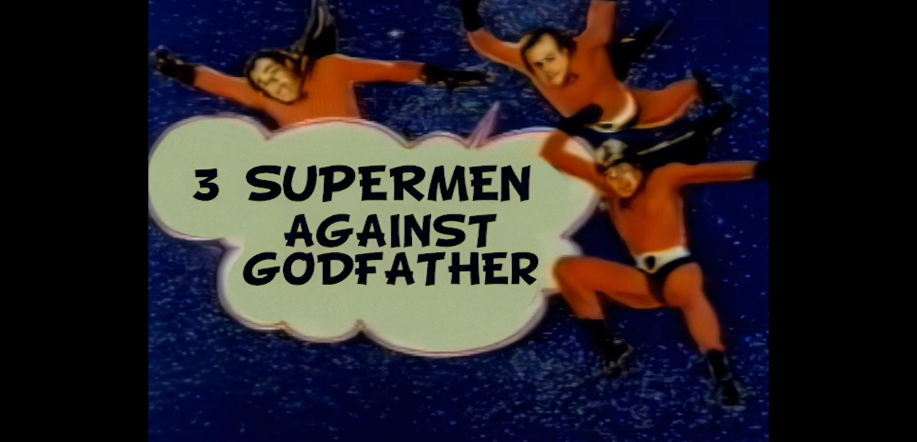
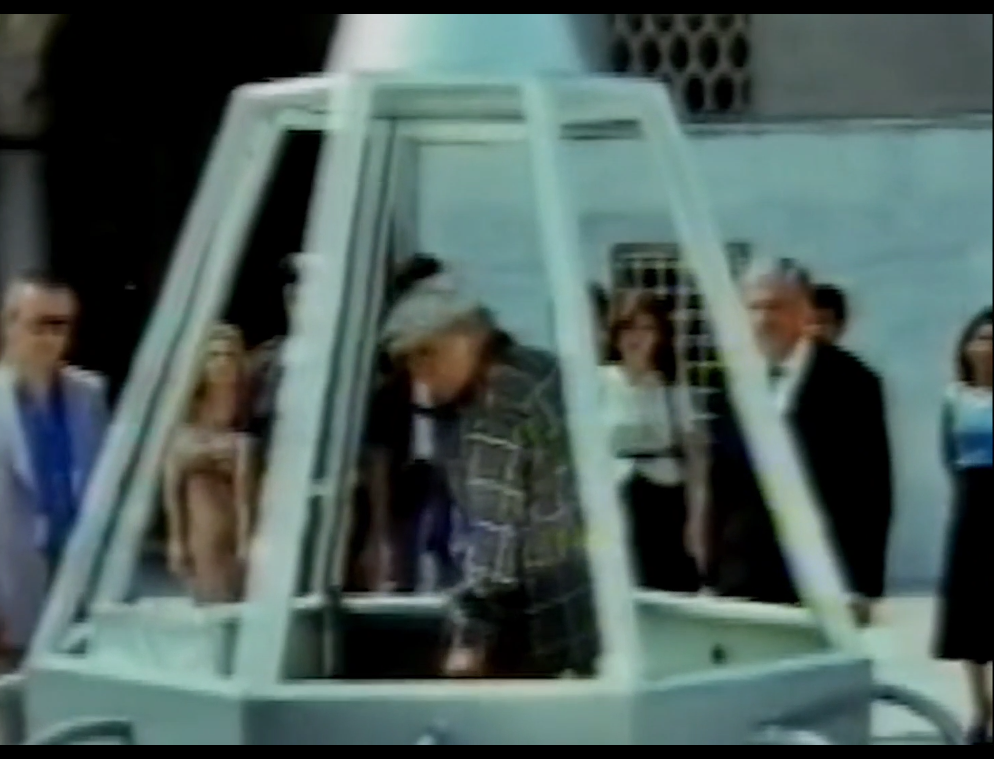



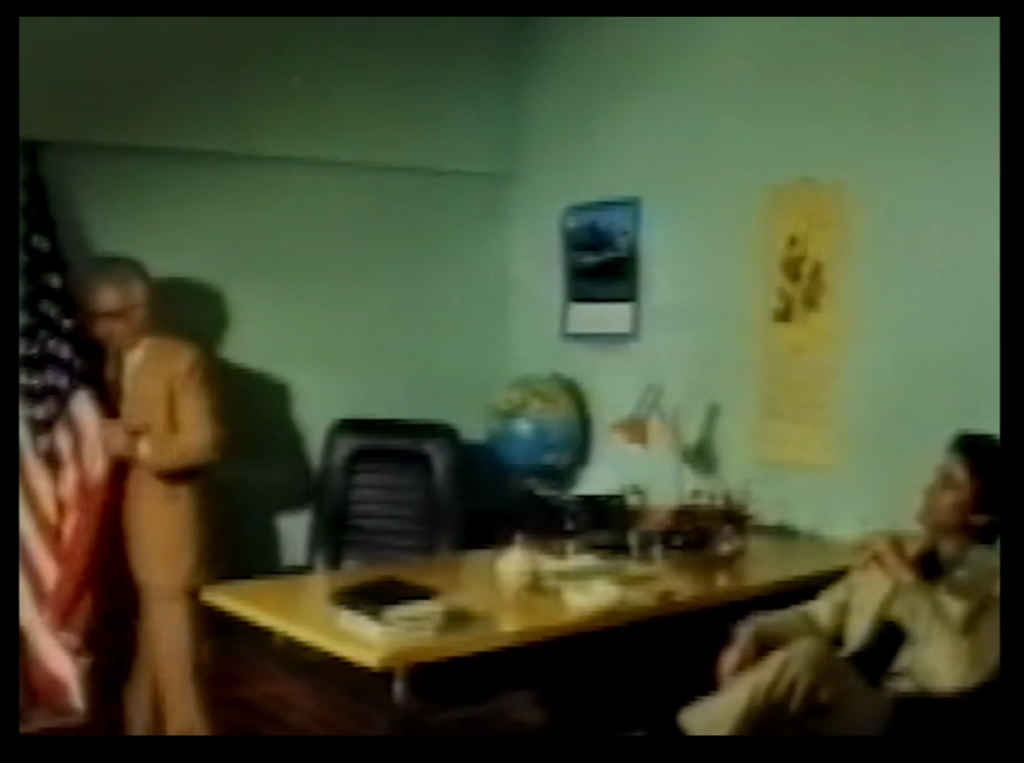

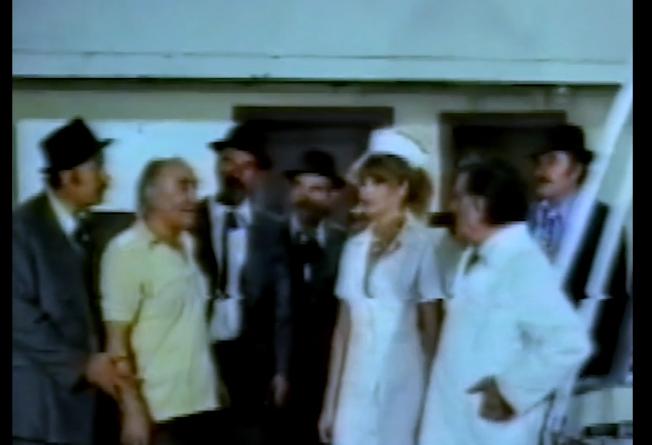

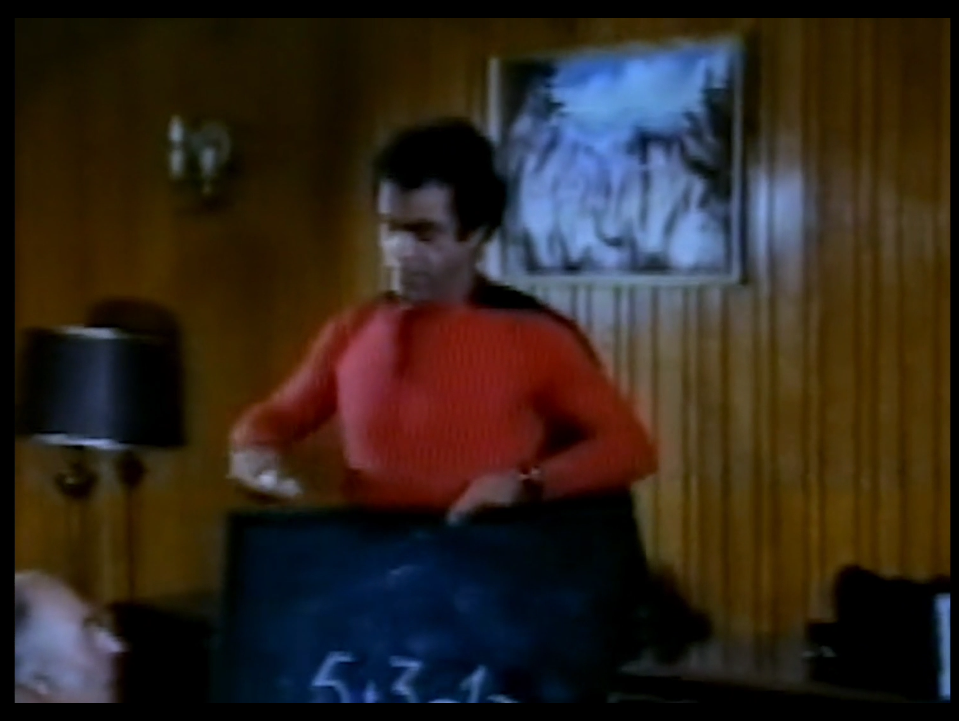
Three Supermen Against the Godfather (1979)
Film review #549
Director: Italo Martinenghi
SYNOPSIS: A scientist has invented a time machine, and uses it to travel back in time in Turkey to the fall of Constantinople, to learn the location of the treasure hidden before the city was sacked. The two thieves known as the supermen learn of this, and decide to try and take the time machine for themselves. But they’re not the only ones interested in it, as an Italian mafia boss, foreign powers, and once again, FBI agent Brad is sent to work with the supermen (against his will) to secure the time machine and protect the inventor…
THOUGHTS/ANALYSIS: Three Superman Against the Godfather (released as Süpermenler in Turkey) is a 1979 film and another instalment of the Three Supermen series of films. This time, the supermen are after a time machine invented by a scientist (not the same one who invented a similar time machine in Three Supermen in the West, of which there is no mention), with the aim of going back to the fall of Constantinople in the fifteenth century, to find out where the royal treasure was buried before it was lost. The two international thieves known as the supermen learn about the machine and decide they want to steal it for themselves, but an Italian mafia boss and some foreign powers are also after the device and the professor; and as always, FBI agent Brad (or whatever his name is this time) is sent by the U.S. to secure the professor and the machine himself, and is ordered to cooperate with the supermen, which he is reluctant to do because of the constant shenanigans he gets caught up in whenever he meets them. The film feels like a return to the classic formula of the films; after the Hong Kong co-production Supermen Against the Orient, which was more of a typical martial arts film that substituted the classic acrobatics with said martial arts, and also messed up what little continuity the series had. While it is a return, it should also be noted that this “original formula” was itself all over the place: some films were science-fiction based others were parodies of spy films, westerns, and so on. With this one, it’s obviously riffing on The Godfather and mafia films, and the sci-fi element of time travel doesn’t really factor into the film at all: they only travel once in the beginning to demonstrate that it works.
As always with the Three Supermen films, the main actors have a bit of a shake up, with only Sal Borgese as the mute superman keeping his role as he has through most of these films. To make things even more confusing this time, Aldo Canti, who played one of the supermen in the first film, returns to the series, but he is instead playing the role of the FBI agent this time, with the other role going to prolific Turkish actor Cüneyt Arkın. The choice of actors doesn’t really make too much of a difference, as their characters aren’t too developed in any particular way, but it’s just interesting to follow this revolving door of casting. The reason for Arkin’s casting is because the film’s production has moved from Italy to Turkey, and I guess his casting would have some appeal to the local market.
The reason for the move from Italy to Turkey is fairly interesting: Italian media became more focused on television, and moved away from cinema in the mid-late 70′s. As such, there was an exodus of sorts of Italian filmmakers to Turkey, where their type of cinema was still more popular. Nevertheless, it would seem this film was hardly released to any cinemas at all, and is probably the most difficult to get a hold of in the franchise. While the film does have the usual slapstick moments, scantily-clad women, and some stunts, we don’t get the typical acrobatics we usually do, probably because the newer cast aren’t actually acrobats, and the older cast probably can’t pull the feats off anymore (remember that this franchise would have been twelve years old in 1979). Overall, Three Supermen Against The Godfather is, for better, or worse, a return to the typical Three Supermen formula that is full of a heap of different ideas and directions that don’t really cohere, but it’s still just a bit of silly fun.
-
#548 – Bruce Lee Against Superman (1975)
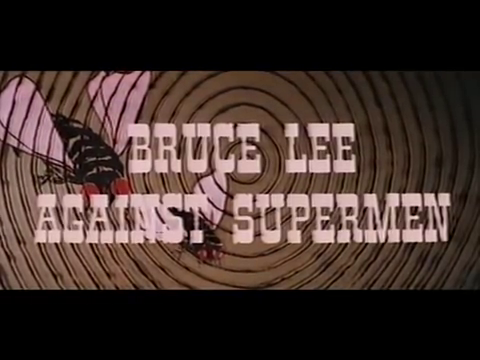

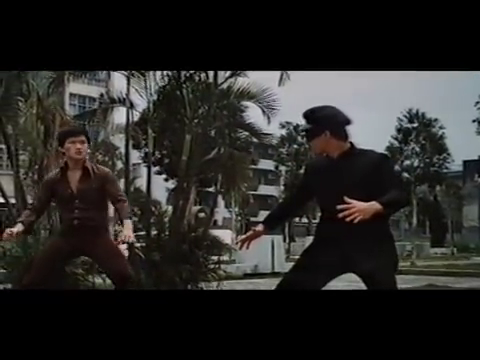
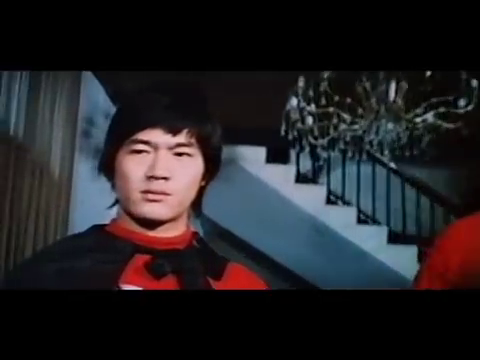
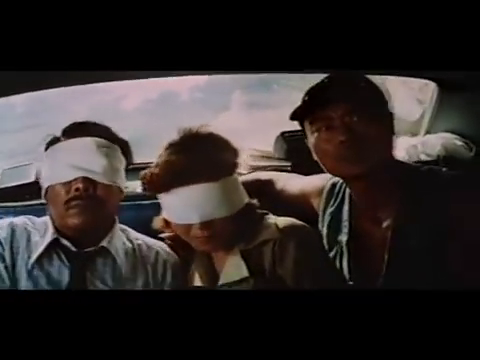
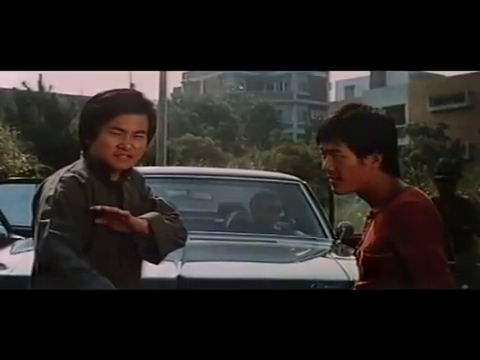
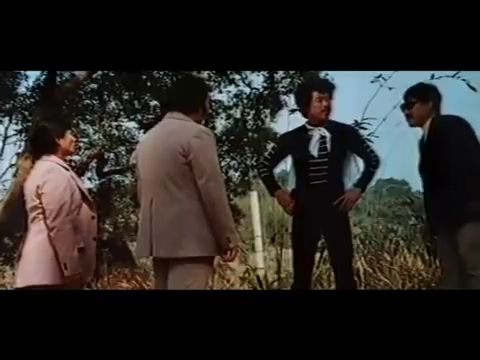



Bruce Lee Against Superman (1975)
Film review #548
Director: Wu Chia-Chun
SYNOPSIS: A scientist, Dr. Ting, has invented a formula that can produce food out of petroleum, thereby potentially solving world hunger. A foreign country has their eye on the formula though, and hire a crime boss to kidnap Dr. Ting and secure the formula for themselves. There plans are being thwarted however, by the superhero The Green hornet, and in response, the villains hire the martial artist Superman to deal with him…
THOUGHTS/ANALYSIS: Bruce Lee Against Superman (Also called Superdragon vs. Superman) is a 1975 martial arts film. The story is a fairly standard one, with a scientist called Dr. Ting inventing a formula that will apparently solve world hunger by making edible food out of petroleum (although I’m not sure using more fossil fuels will really solve the world’s problems). Anyway, Dr. Ting’s inventions have drawn the attention of a foreign country, who wants the formula for their own nefarious purposes. For this reason, they hire a crime boss and his goons to kidnap Dr. Ting and force him to hand over the formula. It’s all very typical for a martial arts film that came out around this time, as the popularity of the genre exploded, and companies were eager to crank as many of these films out as possible to capitalise on that popularity. But here’s where things go beyond that “standard”: The villains are stopped by none other than the Green Hornet (yes, the superhero) and his sidekick Kato, who after the opening scene, are instead dressed up in the red and black jumpsuits used by the Three Supermen in the film series of the same name (albeit with a hornet on the front). With the villains frustrated, they turn to hire Superman (no, not that superhero), a highly skilled martial artist, to defeat the Green Hornet, who barely appears in the film. The whole experience feels like it is a bunch of Western characters and names put in a blender with some martial arts action stringing them together.
To be fair, there is some justification to most of these things, but the sheer complexity of it all for a simple martial arts film is enough to make your head spin. Bruce Lee starred as Kaito in the 60′s Green Hornet TV series, which was edited into a feature-length movie, which explains why the Green hornet shows up. The “Bruce Lee” in Bruce Lee Against Superman is actually Bruce Li, a lookalike for the actual Bruce Lee who starred in a number of knockoff films due cash in on the popularity of the real deal. The red and black jumpsuits that Kato and the supposed Green Hornet wear occasionally are clearly, as mentioned, the suits worn by the main characters in the Three Supermen films, with the picture of a hornet on the front. These were probably left over from one of the Three Supermen films that had been released before which were produced as an Italian/Hong Kong co-production. The Superman thing…I have no justification for. he doesn’t even look like Superman: he’s just a martial artist with a black and white cape and some goons wearing masks.
The martials arts and action is underwhelming for the most part: the choreography in the fight scenes is fine, but bad camera angles and being unable to frame a shot makes watching them difficult. The car chase has the cars going really slow, as clearly no one knew how to do them properly. There’s also a bizarre scene halfway through the film where a guy is chased through street after street for about five minutes, resulting in the anti-climax of the hero just jumping on him from above when they reach an abandoned building. The film is a wild ride in terms of how mixed up and janky it is, and for that reason it might be worth a watch; just don’t expect anything amazing or serious.
-
#547 – Super Stooges vs. the Wonder Women (1974)



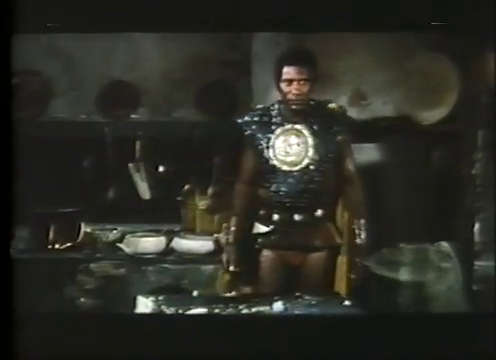
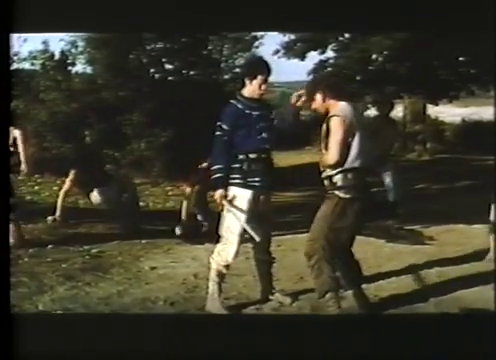
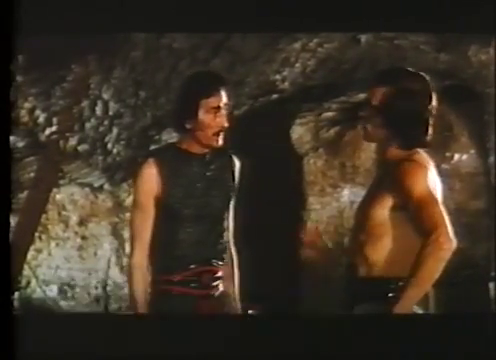

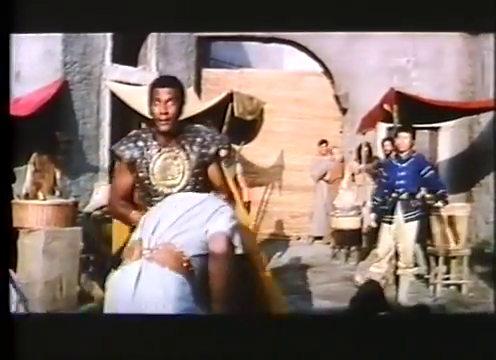
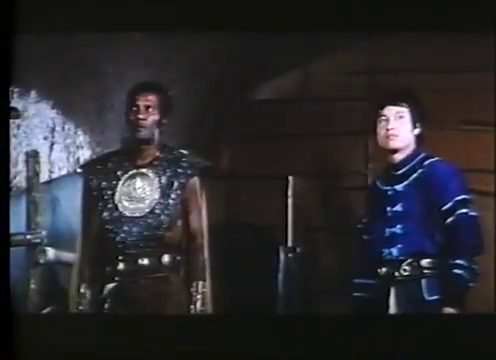
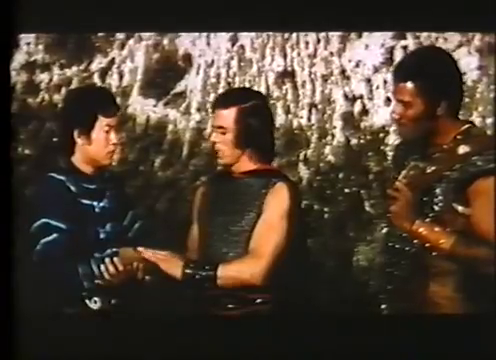
Super Stooges vs. The Wonder Women (1974)
Film review #547
Director: Alfonso Brescia
SYNOPSIS: A tribal village is constantly under threat from a band of Amazon women who lead raids and terrorise the people of the area. The villagers seek help from three men: a man with superhuman strength, a martial arts ,master, and a man who claims to be a God, and the three team up to stop the Amazons and save the village.
THOUGHTS/ANALYSIS: Super Stooges vs. The Wonder Women is a 1974 film, also known as Amazons and Supermen, Return of the Barbarian Women, Barbarian Revenge, amongst others. The film is a derivative of both the film Battle of the Amazons (itself a derivative of the 1973 film The Amazons), and the Three Supermen series. Interestingly, the film is actually made by the same production companies who made those films (with them making the 1973 film Supermen Against the Orient a year earlier). Despite these connections behind the screen, there are no returning characters or story points from these films, and the only similarity to the Three Supermen is that the film stars three men. The plot is simple enough: a tribe of Amazon women are terrorising neighbouring villages. One in particular has turned to a man who claims to be a God, who seemingly protects the village. The plot of the film is simply having these three men (eventually) team up and stop the Amazons. The story does take a while to get going and have the main characters meet up and confront the main threat of the film, but it’s entertaining enough with a mixture of comedy and martial arts. With a runtime of about ninety-five minutes,
Each of the characters have their own unique skills and talents, and perhaps surprisingly, their own story arcs. We have Moog, who has super strength, played by Marc Hannibal, who played for the Harlem Globetrotters. There’s also Chung, a martial artist, and finally Aru, who uses pyrotechnics to fool the villagers and Amazons that he is a God who is protecting the village, and also does a lot of acrobatics too. The variety in the characters and their different origins is pretty interesting, although they don’t really have much time to develop any chemistry between them with the main plot and the individual stories to deal with, but it is at least a decently defined cast.
The Italian/Hong Kong co-production, like in Supermen against the Orient, provides a mixture of Western slapstick comedy, with Eastern martial arts which were popular at the time. There’s a good balance between the two, and while there’s nothing that particularly stands out, at least there’s enough action to keep things energetic and entertaining. We also get some typically scantily-clad women in regards to the Amazons, and while their story doesn’t make too much sense, they get some very odd scenes, such as the opening, which depicts one of their forms of entertainment being to duel with bows and arrows on top of stilts or something…truly bizarre. Overall, Super Stooges vs. The Wonder Women is a silly, cheesy, and messy film that doesn’t offer anything special, does throw a lot of varied characters, entertainment and action into the mix to at least be interesting enough to keep your attention. The runtime is slightly too long for a low-budget film such as this, and could have easily have been trimmed down, but at least the pacing is good, and there’s no protracted scenes of inane dialogue to stretch it out. It feels well made and a decent effort in some parts for a low-budget derivative film, but nothing special otherwise. It’s a bit of a laugh in a “so bad it’s good way” if that is something you want to watch.
-
#546 – Three Supermen Against the Orient (1973)
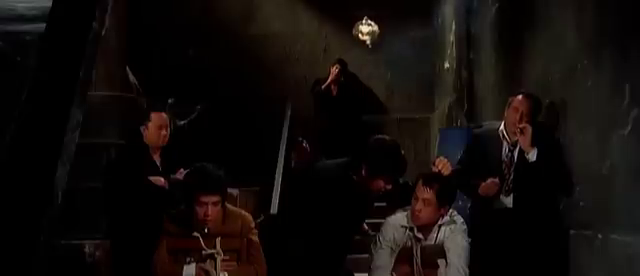

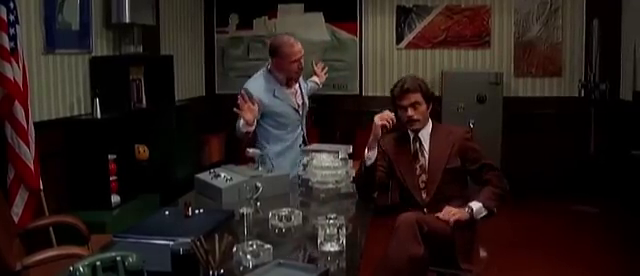
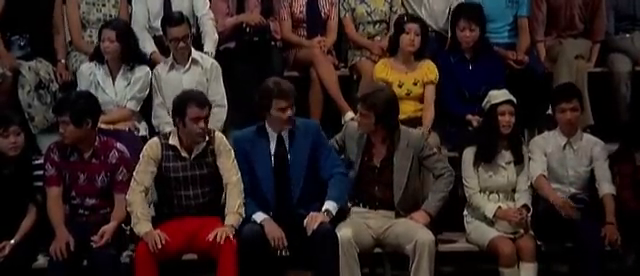
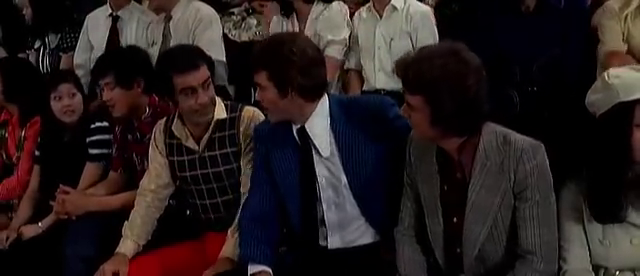
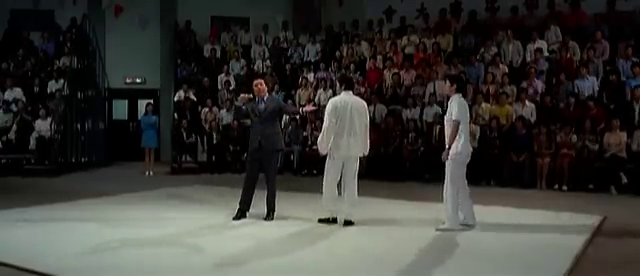
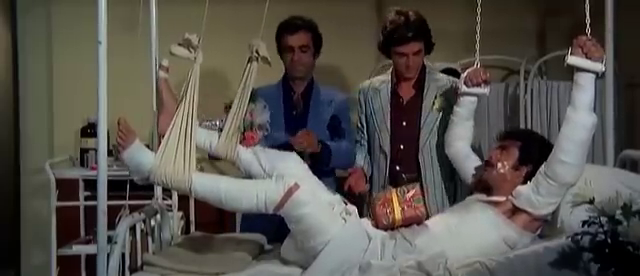

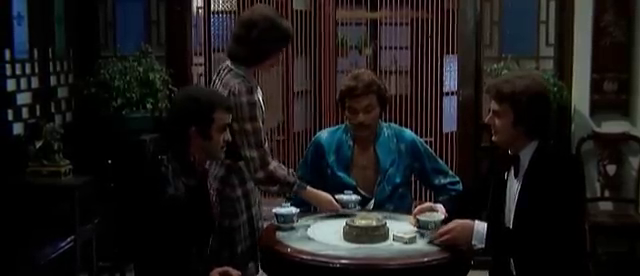
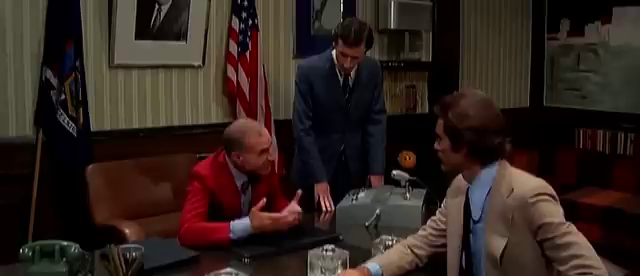
Three Supermen Against the Orient (1973)
Film review #546
Director: Bitto Albertini
SYNOPSIS: FBI agent Robert Wallace is once again summoned on a mission just as he is about to get married: this time, he must find six agents who have gone missing in Taiwan. While there, he meets up with his old acquaintances Max and Jerry, the international thieves “The supermen,” and the three reluctantly team up once again to accomplish their goals: Robert to rescue the agents, and Max and jerry to rob the U.S. embassy…
THOUGHTS/ANSLYSIS: Three Supermen Against the Orient is a 1973 martial arts/comedy, and the fifth film in the Three Supermen series, released the same year as the previous Three Supermen of the West. The film follows the typical premise of these films, with an FBI agent teaming up with his old acquaintances the two international thieves, this time to save a group of six agents who have been kidnapped and are being held in the far east. The most notable thing about the film is, if you’ve seen the other films in the series, is that is completely incompatible with them in terms of continuity. For example, the three main characters know each other, which means their previous antics in the other films probably still happened, but the main issue is that the supermen don’t have their bulletproof suits, which is their main selling point. They get them about half way through the film when FBI agent Robert Wallace manages to persuade the American ambassador to hand them over, and the supermen are surprised by them being bulletproof. Adding this up, it seems that the previous films happened, but also didn’t happen at the same time? As far as I am aware, this is the first Three Supermen film to get an English dub, so maybe they wanted to reintroduce the suits for first-time audiences, but then why have the characters know each other prior to the film? It’s very confusing. On the one hand, there’s not too much continuity between the films, as they are self-contained adventures, but at least they didn’t contradict each other.
Apart from the continuity issues, the film feels very much like a typical martial arts film. The supermen don’t even appear until thirty minutes into the runtime, and all this time is spent Wallace wandering around the wrong city before he finally goes to Hong Kong. In some respects, it just feels like a standard martial arts film with the Three Superman shoehorned in, but the director of some of the previous films directs this one, so there is come continuity behind the scenes. There’s still the comedy elements of the franchise and a little bit of slapstick, but it doesn’t go so far as to spoof martial arts films, like it spoofed some other genres in the previous films.
As with some of the other films, the actors have been swapped around: this time, only Sal Borgese, who plays the mute Jerry, returns, with the other two being new actors. In fact, there names are different too, but they are supposed to be the same characters, which again makes the continuity even more confusing. The other characters don’t add too much, but fill their parts just fine. The typical acrobatics that the series is known for is put aside in favour of martial arts, and it’s a shame we don’t get a mixture of the two (the new actors probably don’t have the expertise too). The martial arts was choreographed by a young Jackie Chan, and on the whole it’s well executed and polished, but nothing overly special in the larger context of the huge volume of martial arts films from the seventies.
Overall, Three Supermen in the Orient combines the silliness of the franchise with yet another genre in the form of the martial arts films. However, it sidesteps the spoof and satire in favour of simply making a competent martial arts film with some slapstick western comedy thrown in from time to time. The plot makes no sense in the continuity of the series, but they’re all mostly standalone films anyway, so it can be overlooked. The film doesn’t really add anything to the series, or distinguish itself as a martial arts film, but it’s a decent balance of western comedy and eastern martial arts, backed by competent choreography that might appeal to a broader audience. however, fans of the series may not be too impressed with the riding roughshod over the continuity of the series, and having the main characters rake a backseat.
-
#545 – Three Supermen and Mad Girl (1973)





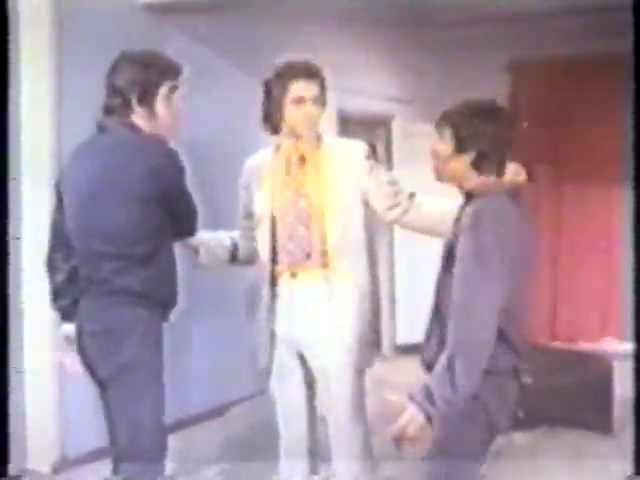
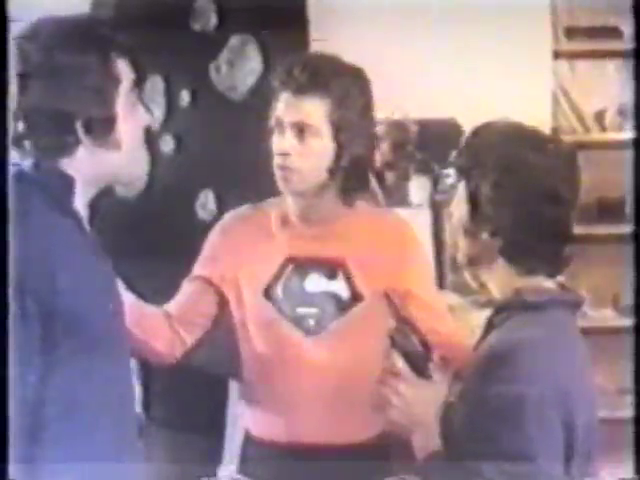

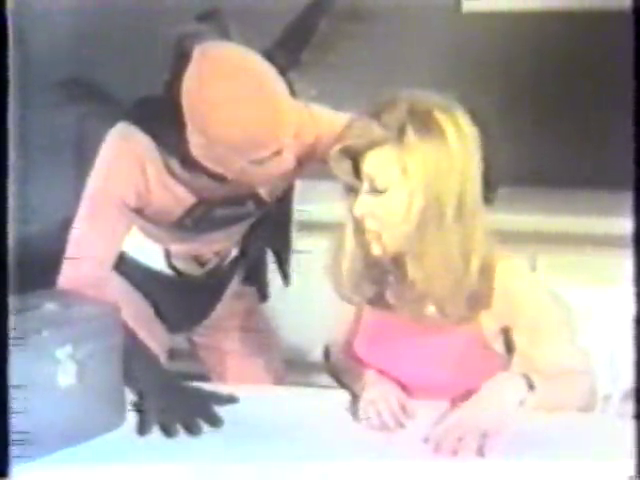

Three Supermen and Mad Girl (1973)
Film review #545
Director: Cavit Yürüklü
SYNOPSIS: An evil organisation led by Mad Girl and a guy in a devil costume are trying to take over the world. The only people that can stop them are the three supermen, with their bulletproof suits…
THOUGHTS/ANALYSIS: Three Supermen and Mad Girl is a 1973 Turkish sci-fi film, and a unauthorised of the Three Supermen characters. The plot is about as simple as you can get it: an evil organisation consisting of Mad Girl, a man in a devil mask, and a bunch of men in green hoods and cloaks, are attempting to take over the world. The only people that stand in their way are the three supermen, who get to stopping them. There are no subtitles for this film that I could find, but I’m pretty sure I didn’t miss anything, as there’s nothing beyond the surface to really get into: if you know who the good guys are, and who the bad guys are, you’re pretty much set. The structure of the film consists in the cast going from one fight scene to another, and you can more or less follow what is happening in them as their really isn’t much to get beyond some chasing and fighting.
This film comes from a whole market of Turkish knock-off films that take characters (and sometimes actual footage) from other franchises without permission and make their own film. As I’ve mentioned before, this is maybe the sort of thing you could get away with in the 60′s and 70′s, but nowadays, with the internet and such, there’s no way you’d get close to releasing such a film without being found out and sued into oblivion. This is one of the only examples I’ve seen which uses a non-U.S/U.K. based franchise, which leads me to think the Three Supermen was a bigger deal than I believed. With regards to the three supermen themselves, their characters are in keeping with the actual films, with one being mute, and one being a government agent of some description. The costumes as well are accurate, even though they are pretty easy to emulate. The only difference is that the costumes in this film have a big “S” emblem on the chest, which is obviously meant to be the actual “Superman” logo that he wears on his costume. The villains are just typical villains and there’s nothing to really say on that point, apart from they have a robot which is perhaps the best/worst b-movie robot I have ever seen: it really just looks like someone wearing a few cardboard boxes.
Three Superman and Mad Girl is obviously a low budget rip-off of an already low-budget franchise, but I suppose credit should be given to the film for having a good amount of extras in costume, and that it doesn’t bloat the storyline with unnecessary plot and just sticks to a variety of fights and chases. There’s a fair amount of locations too, so it’s at least not all being shot in someone’s basement. Overall though, Three Supermen and Mad Girl is a very low-budget affair that isn’t particularly noteworthy, but is at least short with a sixty-five minute runtime, and focuses no the things which are entertaining and action-oriented. Also probably also worth watching just for one of the cheapest looking robots ever seen on film.
-
#544 – Three Supermen of the West (1973)
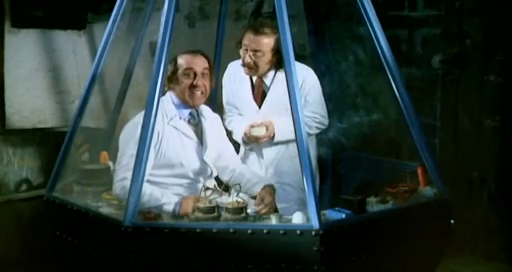
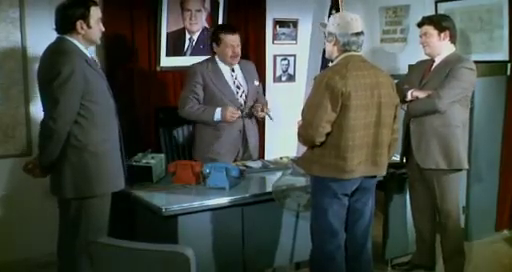
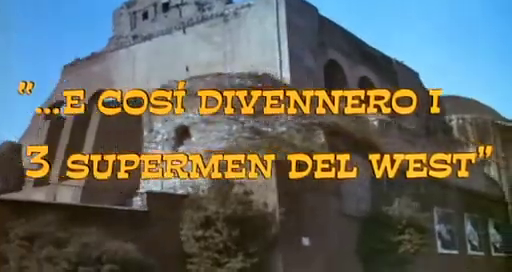
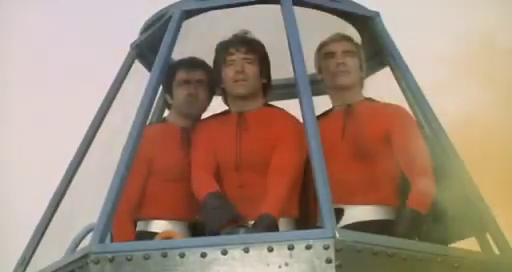
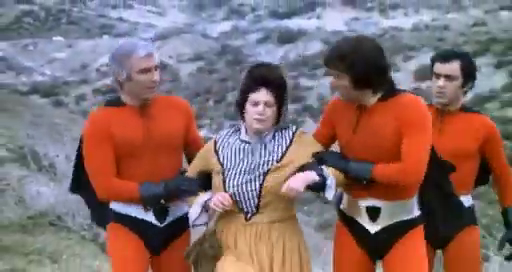
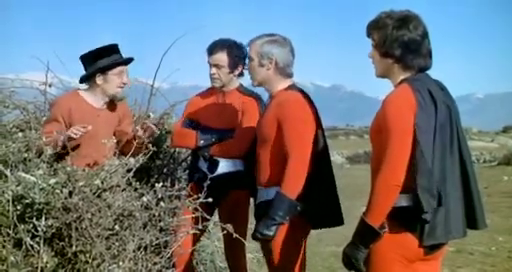
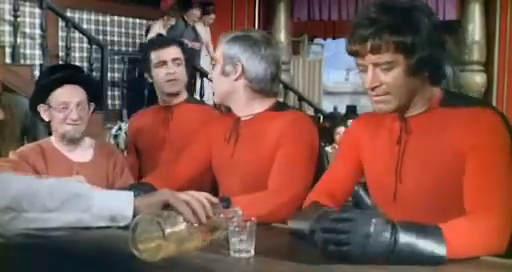
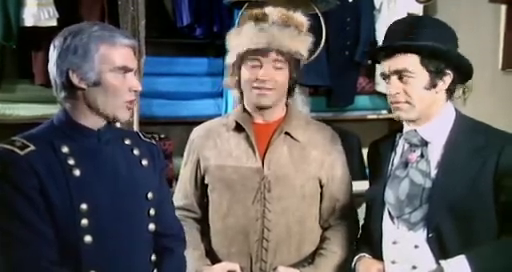
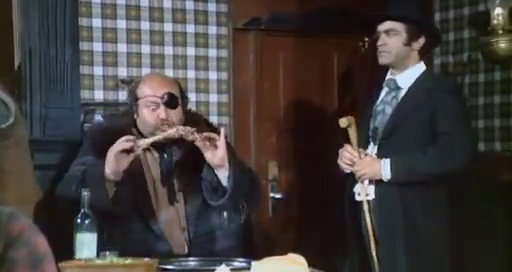
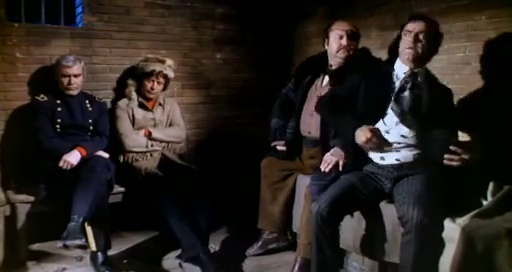
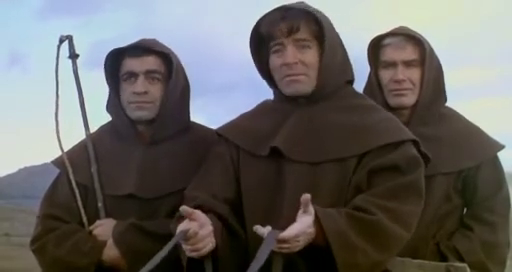
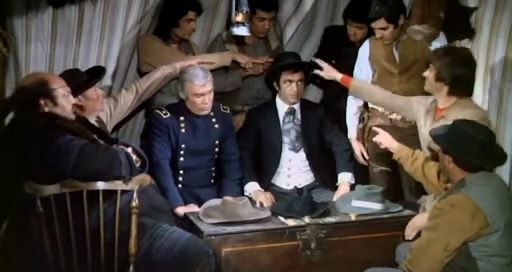
Three Supermen of the West (1973)
Film review #544
Director: Italo Martinenghi
SYNOPSIS: The three supermen are once again apprehended for a mission by the government, this time to destroy a time machine built by two scientists. The supermen manage to find the scientists and the time machine, but are accidentally transported back in time to the Old West, where the they meet a beautiful woman, and decide it might be alright to stop for a little while…
THOUGHTS/ANALYSIS: Three Supermen of the West is a 1973 sci-fi film and the fourth film in the Three Supermen series. The film starts in the way in which you should be accustomed if you’re following the series, as the government (of some country, or the CIA…it changes), again calls for agent George Martin to team up with the international thieves known as “the supermen,” in order to destroy a time machine invented by a pair of mad scientists. As always, the supermen are up to their old tricks, this time in Rome, where they’re scamming an American tourist into buying the colosseum in Rome off of them. Eventually, George chases them down after plenty of running and fighting, and the three head to stop the scientist, who has already finished the invention and travelled through time. They track him down, but accidentally end up activating the time machine themselves, transporting them to the Old West. There, they meet a young woman, and decide to stay a while. While the story in the second and third films was more grounded in the sense it was a spoof of typical spy films, this one just decides to loosen its grip on reality and go full sci-fi. It is reminiscent of the first film, which had cloning and a machine that could turn people into jewels as part of it’s story. Anyway, there’s not much direction or purpose in the story: the supermen travel back in time and just decide to stop a while because of a woman, leading to some typical Western genre hijinks. It’s a good opportunity for the film series to spoof a different genre this time (Westerns instead of spy films), but there’s nothing deeper to the story than that. Fortunately, the action and fighting is still full of energy, so it’s entertaining enough, even if it doesn’t go anywhere.
The three supermen are the same characters you will know from the previous films, but as always, some of the actors have changed between films. This time, it’s just the one, with the role of Brad being recast. The rest of the supporting characters are fairly forgettable, but they play typical, but necessary parts well, as they are fairly expressive and over-the-top caricatures. In fact, a lot of the film has a much more slapstick feel than its predecessors, with the fights becoming increasingly silly: at one point they even throw a cream pie at someone’s face, just to hammer the point home. It definitely captures that “Old West” feel despite being filmed in Milan, so credit should be given there. Also, to the silly sequence of the two scientists travelling through time, which shows them falling through various periods of history, made possible with stock footage of other movies, although some of the footage is in black and white, which is a silly little goof. Overall, Three Supermen of the West is more of the same mindless entertainment you got from the previous films, maybe even moreso, as the lack of direction in the story, and the more sci-fi elements and slapstick humour make the film more detached from reality than its predecessors. Still, it’s a little bit of fun so if you got through the previous ones, you can get through this one too.
-
#543 – Three Supermen in the Jungle (1970)

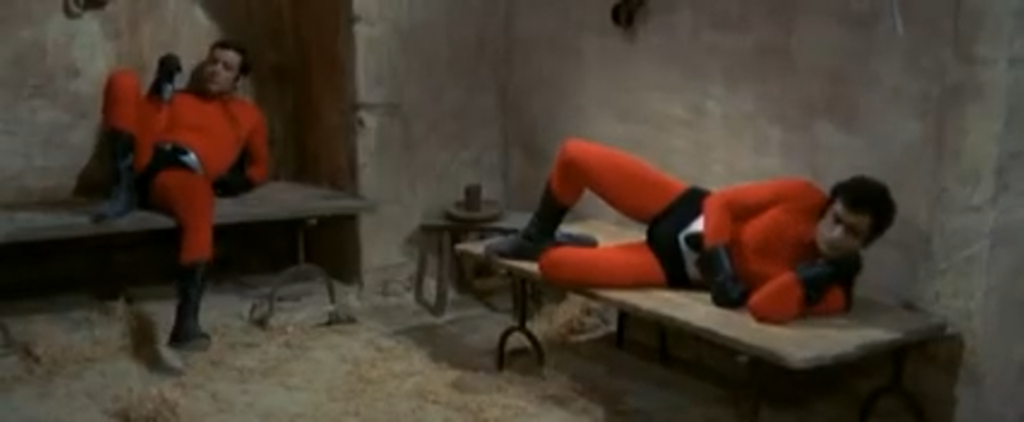
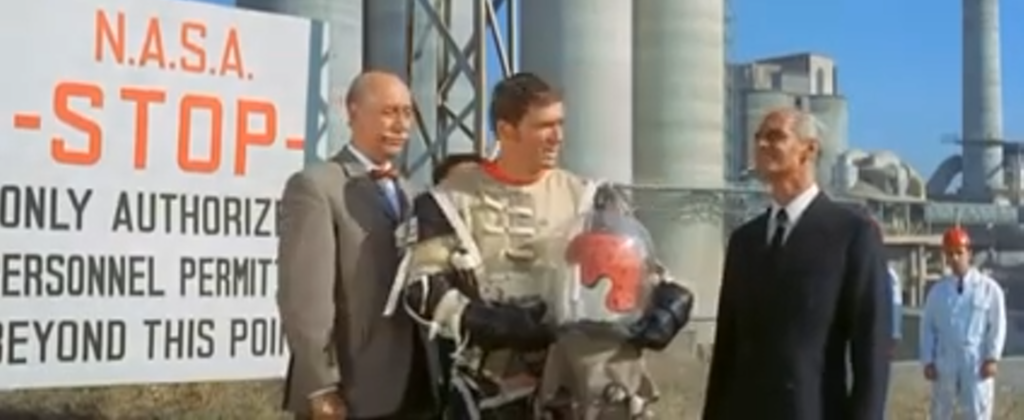


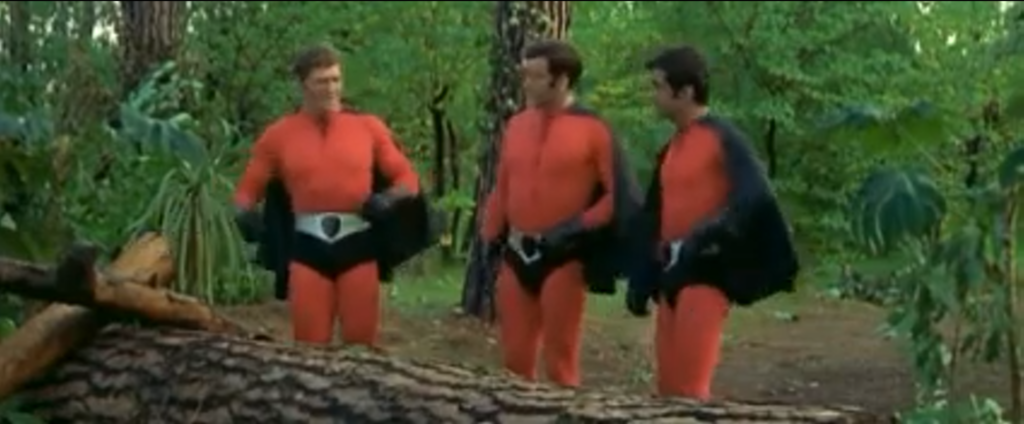

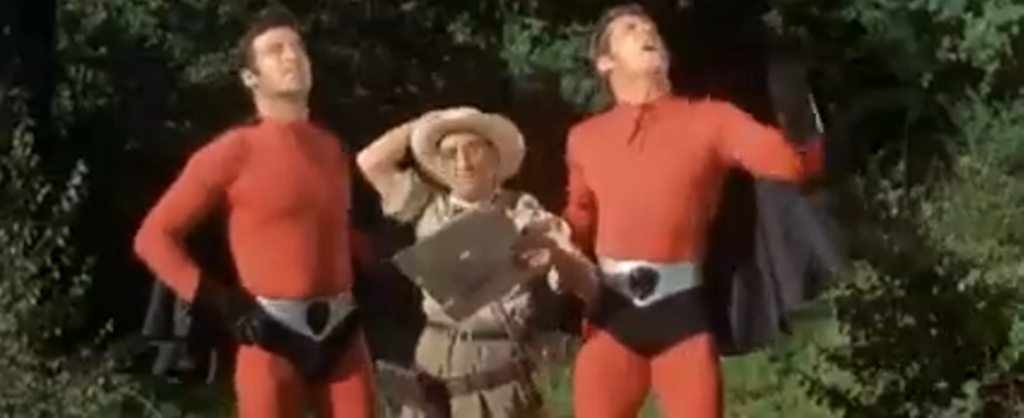
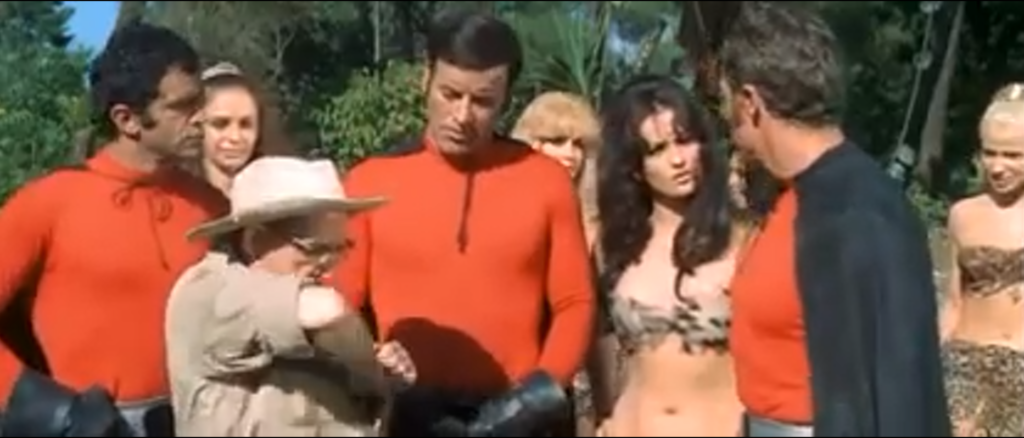

Three Supermen in the Jungle (1970)
Film review #543
Director: Bitto Albertini
SYNOPSIS: The international thieves known as The Supermen are once again caught by the government and, along with government agent martin (again), they are forced to accept a mission on their behalf. This time, they are to head to Africa to stop the Russians from taking control of a uranium mine owned by the local tribe…
THOUGHTS/ANALYSIS: Three Supermen in the Jungle is a 1970 Italian film, and the third in the “Three Supermen” series of films. We once again see the thieving duo known as “the Supermen,” who run around in their bulletproof suits, up to their old tricks, and the government wants to apprehend them to undertake a critical mission. They once again get agent Martin to do it, who is stopped just as he is about to get married, and the three are reunited once again to undertake a mission of critical importance: to head into the jungles of Africa, and prevent the Soviets from acquiring a lease on a uranium mine protected by the local tribe. The film’s plot is essentially following the trope of the “African jungle” adventure, somewhat leaning on parodying them, but mostly just a typical old comedy. As you might expect, a lot of the tropes about Africa, the jungle and the “natives” are outdated stereotypes that are not based in reality, but but certainly not as bad as some other films that do this: being a comedy means that you take these tropes less seriously, and not as indicative of reality.
The films in this series have got constantly less fantastical and sci-fi: as the first one had elements of cloning, and machines that could turn things into precious jewels, and the second just centred around retrieving a film, the third one just revolves around the lease on a uranium mine, which is never actually seen, which is probably a more typical cold war plot. The film makes up for the thin plot by having a variety of locales, plenty of comedic sequences, and energetic fight scenes that instead keep the film at a good pacing, and energetic through most of its run. It feels less threatening than the other films, and perhaps goes for a much more slapstick approach to it’s violence. I wouldn’t say this makes it more for younger audiences though, as there’s plenty of scantily-clad women and innuendos abound. While the second film replaced all the main characters form the first, here they’ve managed to retain two of the three from the second, so at least there’s a bit of continuity. Again, the actors aren’t quite the professional acrobats as the ones in the first film, but the fight scenes are still have plenty of energy and action, with a competent level of choreography involved.
Overall, Three Supermen in the Jungle is a perfectly entertaining low budget film that is lacking in substance or novelty sci-fi elements, but relies on it’s slapstick humour and energetic fight scenes to sustain its energy throughout its runtime; for which it succeeds fairly well. Its fairly forgettable and it’s tropes are outdated, but its got enough going for it to keep viewers from falling asleep.
-
#542 – Three Supermen in Tokyo (1968)
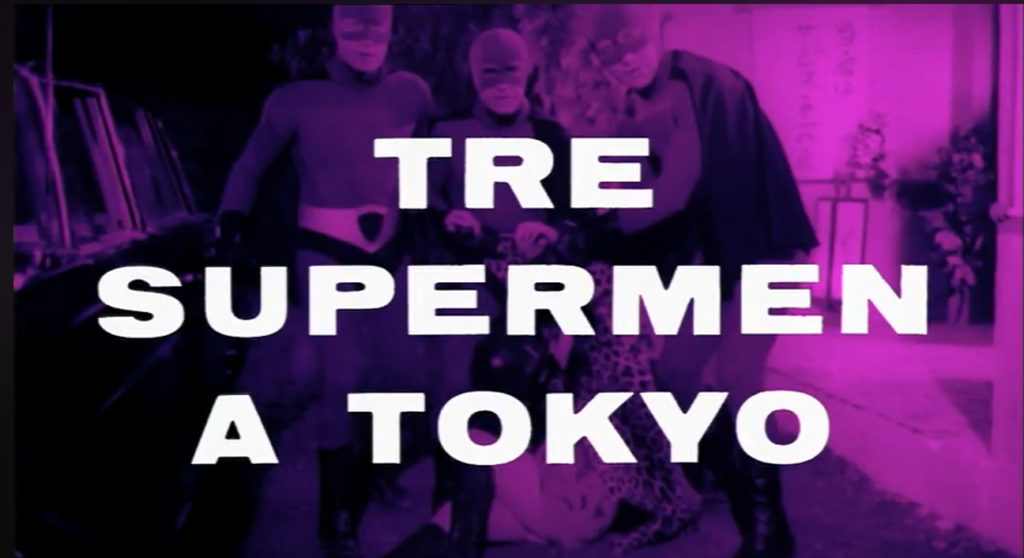
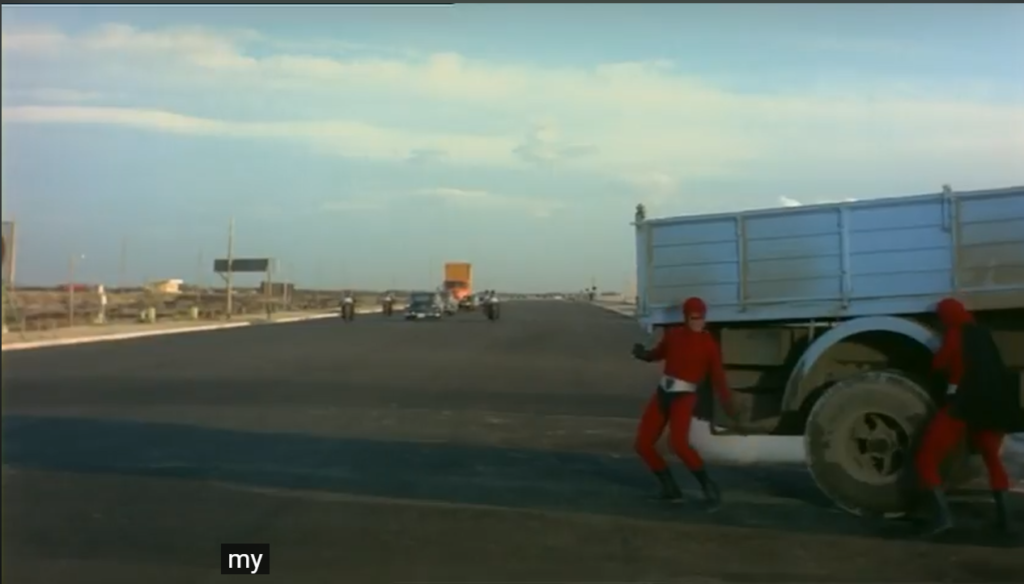
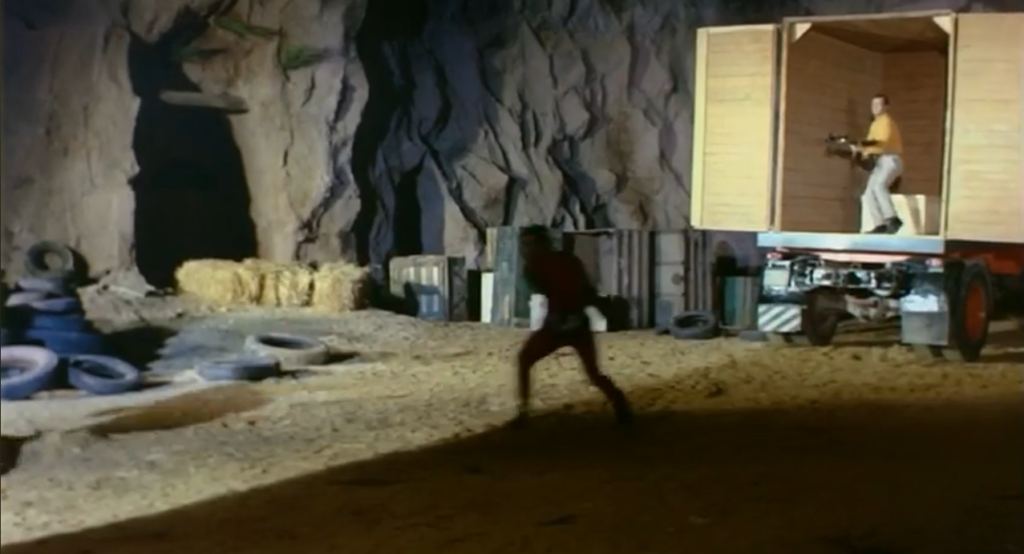
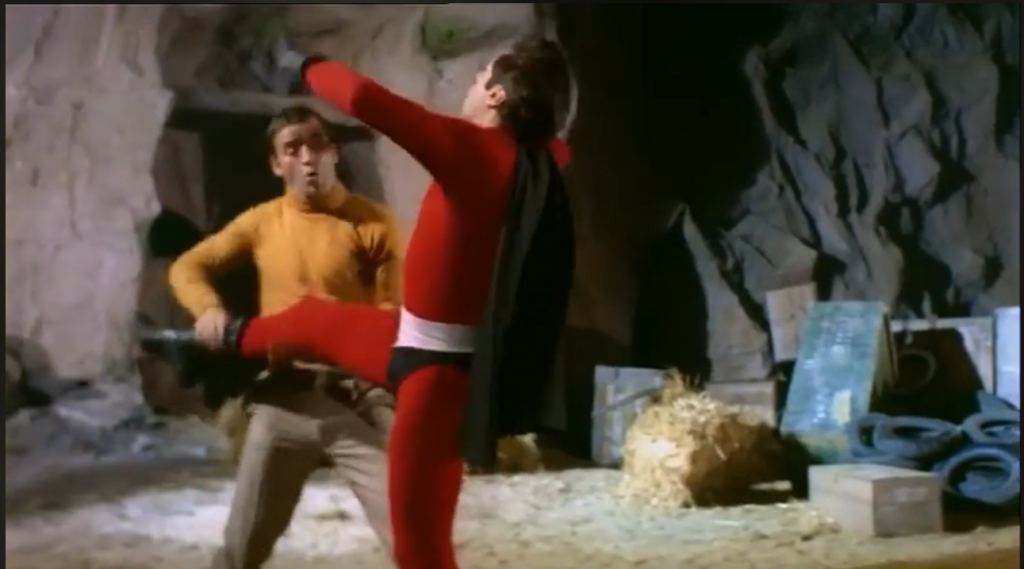
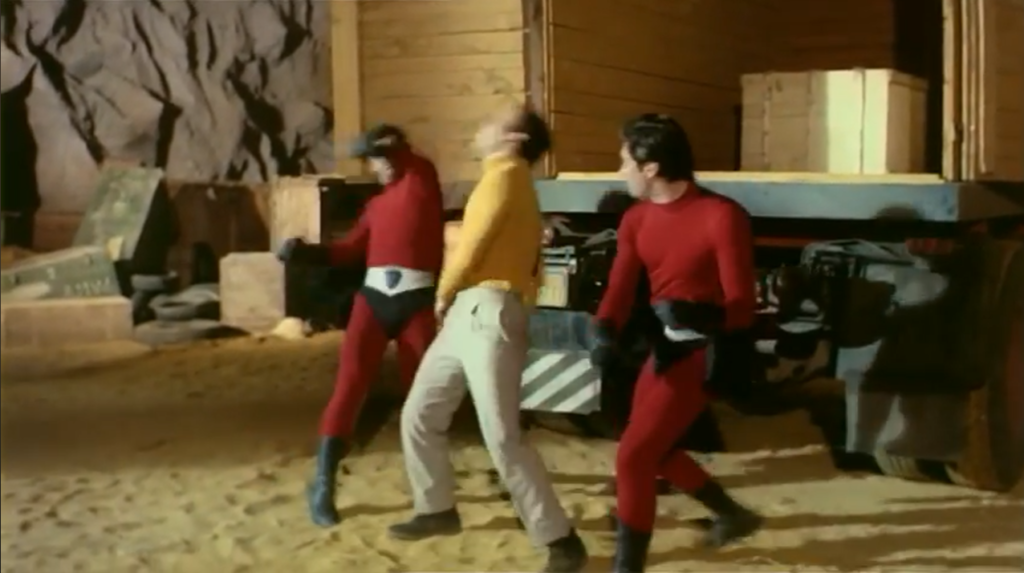
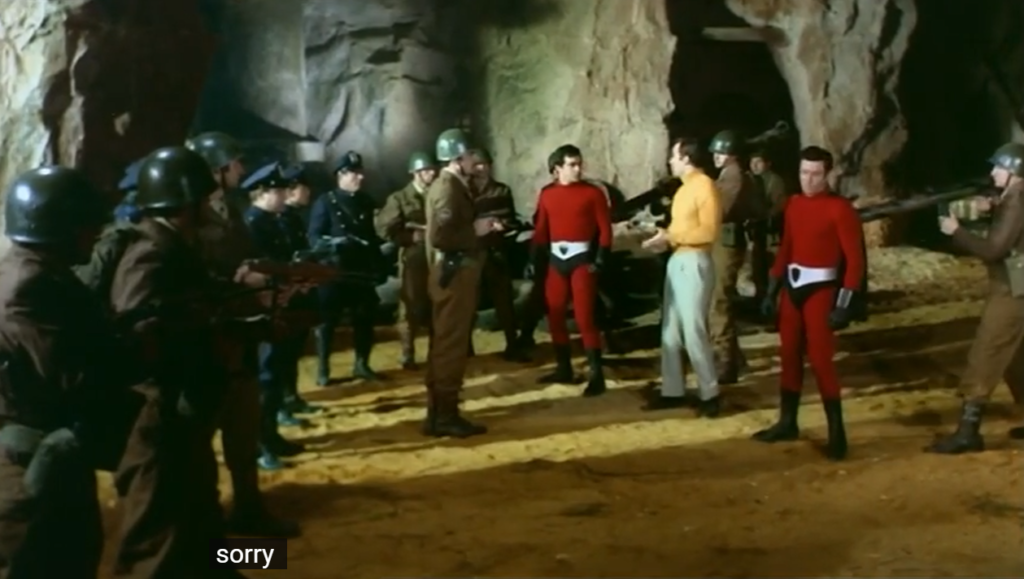

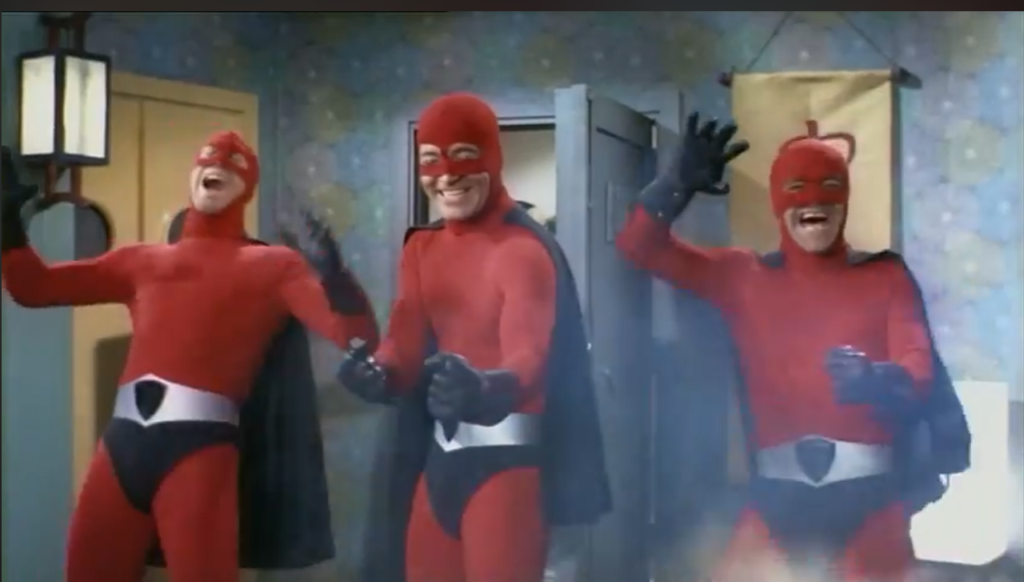
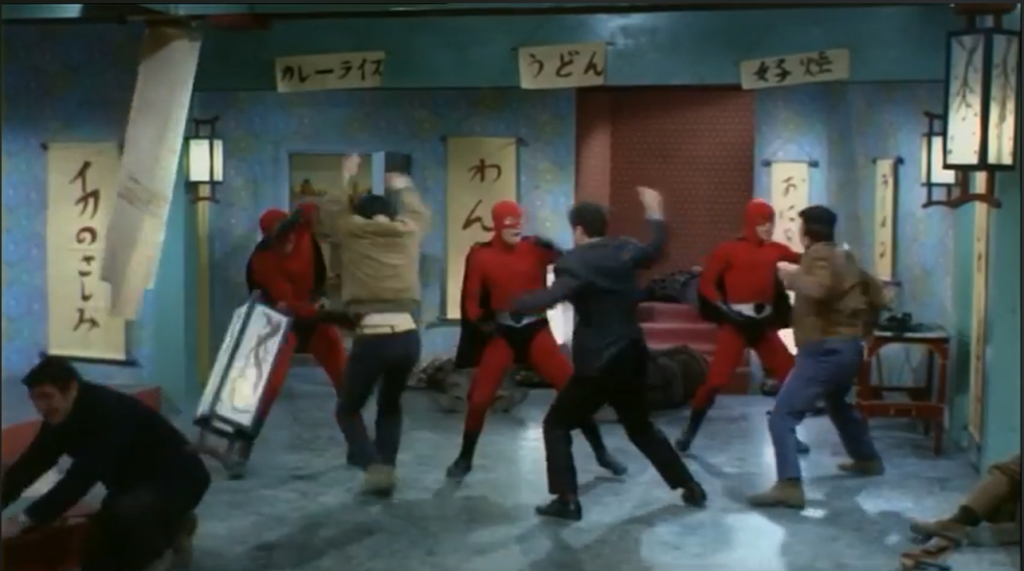
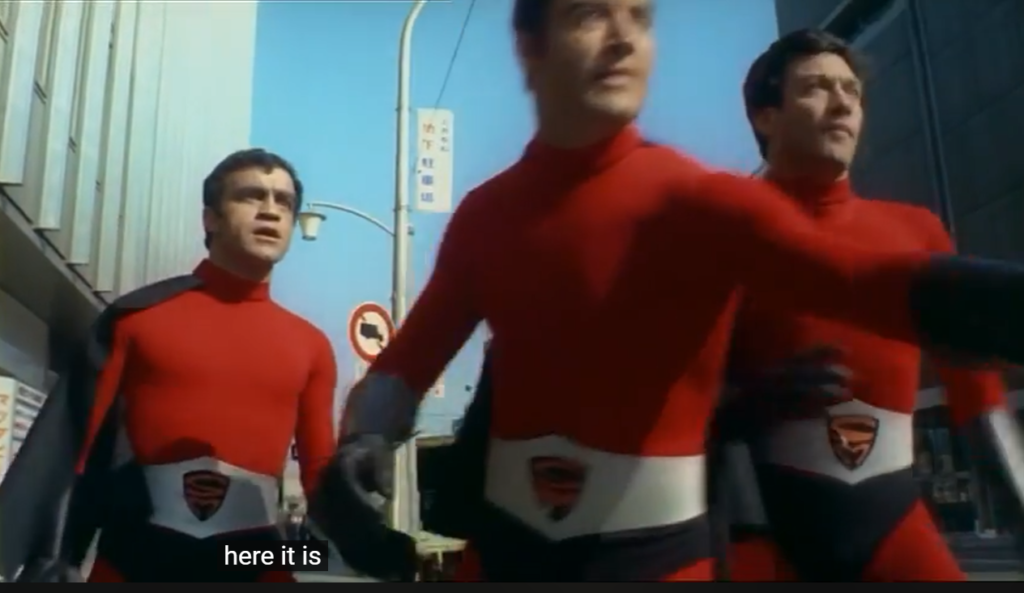
Three Supermen in Tokyo (1968)
Film review #542
Director: Bitto Albertini
SYNOPSIS: The pair of thieves known as “the supermen” are caught in a trap by law enforcement. However, they are offered a deal: their sentence will be commuted if they accept a mission to find a film of a spy and diplomat that, if revealed, will cause a huge political scandal. The two supermen are joined by Martin, a government agent, and the three head off to Hong Kong and eventually Tokyo to find the film and the spy…
THOUGHTS/ANALYSIS: Three Supermen in Tokyo is a 1968 film and the sequel to the 1967 film The Three Fantastic Supermen. The film opens up with the two international thieves who wear bulletproof suits known as “the supermen,” who are attempting to steal the statue of David, which is being transported for exhibition. unfortunately, the whole setup is a trap to lure the two thieves, and the government agent Martin manages to bring them in. The thieves are offered a deal: the criminal charges against them will be dropped, if they agree to undertake a mission on behalf of the government to retrieve a compromising film that a spy has in their possession, that they will show to the public in twenty eight days. The revelations of this footage will bring down the government, and might instigate world war three, so the stakes are pretty high. The two thieves are sent along with martin to Hong Kong and then Tokyo, where they believe the film and the spy who filmed it to be hidden. The film, like it’s predecessor, is a spy spoof/parody poking fun at films like the James Bond 007 series, and is situated in a big scene of Italian spoofs that were released around this time (and for a long while after). The story is fairly standard with no real surprises, but the emphasis is more on the entertainment and comedy than the plot. The humour itself has some decent moments, but not as gripping as the first film, which had a lot more outlandish elements to keep it interesting.
The main difference between this film and the first one is that none of the original actors return in the sequel, apart from one side character. The main issue with this is that the three main characters (the thieves) were professional acrobats, and could pull off some quite impressive stunts and choreography during the fights and action scenes. The replacement actors clearly do not have the same level of expertise, and the film loses one of it’s most unique aspects. The action scenes are still competent, but are lacking compared to its predecessor. Credit to the film should be given for actually shooting a good amount of the film on location in Tokyo. On the downside, there are instances when goons in the fighting scenes are clearly white people made to “look” Japanese with make up and such. Overall, Three Supermen in Tokyo doesn’t quite match up to the original film, and any unique elements that it had are done away with, leaving a more streamlined, average film that could easily get lost amongst the sheer volume of Italian films spoofing the spy genre.

